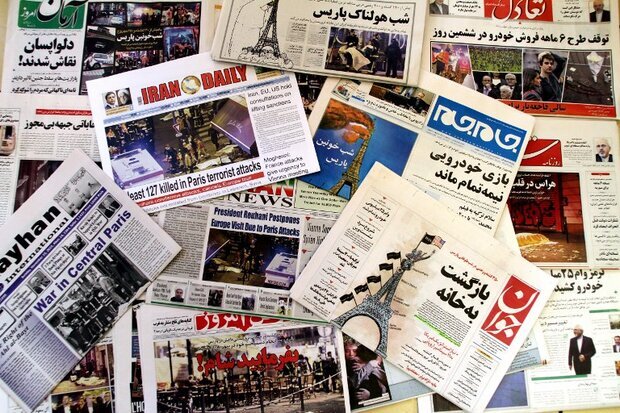Martyr Soleimani never trusted America

The Kayhan newspaper wrote in its editorial that Sardar (General) Soleimani never trusted America, but the optimistic side who trusted the West many times and who gave huge concession from the “pockets” of the Iranian people, saw deception and disloyalty. Despite all this, they still promoted trust in America and, unfortunately, they opened the main front inside and against sympathetic critics.
Haj Qassem – like the members of Zarif's team – never said: “Kerry’s signature is a guarantee” and “It is not possible for America not to fulfill its commitment”. After revelation of facts and the public protest, Zarif said: “The agreement with the United States is not as valuable as the ink on the paper.” The result of adhering to the JCPOA was more sanctions. But even stranger than these bitter and costly confessions of Zarif’s team was the next position of Mr. Rouhani who said: “Trump, who is illiterate, left the JCPOA with a signature; the new president of the United States just signs one, (and) we will return to the commitments”! The psychology of this team was completely in the hands of the enemy, as the Radio France website wrote in Mehr 1392(October 2013): “The West’s evaluation of Rouhani’s government is an interaction with a debtor and eager salesman who finds himself perforce to sell national rights. If the buyer is patient, the seller will sell at a lower price.”
Iran: Washington is worried and confused about the region
The Iran newspaper discussed the visit of the U.S. Secretary of State to Saudi Arabia. It wrote: Following the agreement between Iran and Saudi Arabia, the Zionist authorities, who had used all their capacities to normalize relations with Riyadh and define Iran as a common enemy, are now unable to find out an answer to the question of “exactly where they are now”. Previously, Tel Aviv’s main focus was on mobilizing regional and international parties to block any solution that would recognize Iran’s important role in the region and thus change the balance of power and security and strategic equations at the regional level.
This is despite the fact that the current changes following the reconciliation between Tehran and Riyadh can create security-military challenges against Tel Aviv and then neutralize this regime’s crisis-making policy and provide an opportunity for the Islamic Republic to end crises and reduce tension with neighboring Arab countries.
Therefore, the agreement between Saudi Arabia and Iran was an unexpected hit to actors such as Tel Aviv, who had placed their power source in provoking conflicts and sectarian divisions, and creating chain of crises. The sum of these changes gives enough reasons to evaluate the hasty trips of American officials to Riyadh. The Islamic Republic’s innovative diplomacy has confused Western actors, especially the United States, and made them flustered to put a brake on the rapid developments in the Middle East. However, this time it seems they cannot withstand the strong determination by regional countries to heal the rifts among themselves.
Arman-e-Emrooz: Bin Farhan’s souvenir
Arman-e-Emrooz addressed Blinken’s trip to Riyadh. The paper said: Richard Goldberg, an expert on political issues, said that one of the motivations to hold the recent negotiations is to prevent Saudi Arabia from moving more toward China. In an agreement which was brokered by Beijing in March, Riyadh and Tehran agreed to restore formal diplomatic relations that had been cut seven years ago. Goldberg said: “The kingdom is on the defensive. Obviously, efforts to warm up relations will require more than a trip by the National Security Advisor and the Secretary of State.”
The coincidence of these events with the declaration of Bin Farhan’s visit to Tehran and the reopening of the Iranian embassy in Saudi Arabia has caused more suspicions about the triangle of Iran, America and Saudi Arabia. The triangle whose sides tend to reduce tension in the Middle East, and may also be the souvenir of Bin Farhan from Riyadh for Tehran. A souvenir that should be expected to arrive in Iran in the coming days, although the exact time of the visit of this high-ranking Saudi diplomat to Iran has not yet been declared.
Ettelaat: Iran-Turkey ties from threat and controlling to cooperation
In a note, Ettelaat discussed the relations between Ankara and Tehran and said: The Islamic Republic of Iran can resolve Turkey’s concerns in many fields through active and innovative planning and policies. Instead of bitter rivalry with Turkey, Iran can cooperate with this important and influential country in the region and change the course of events toward cooperation and meeting common interests. Cooperation and synergy on Syria, mutual cooperation to neutralize Western sanctions against the two countries, cooperation in the field of rational and effective confrontation with the Kurds in the region and joint planning to deal with the crisis of illegal immigrants are some of the reasons that Iran and Turkey have common interests and working on them can make the approaches of the two countries closer to each other and reduce the level of mutual threats and pressures of the two sides against each other.
Leave a Comment